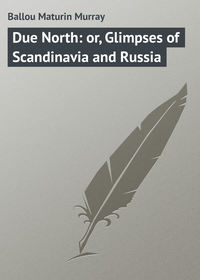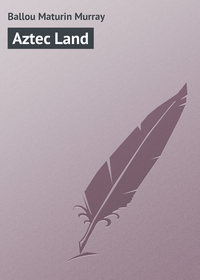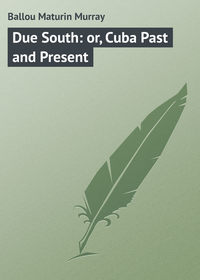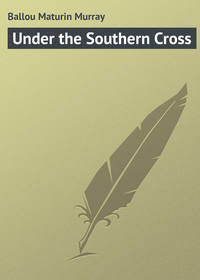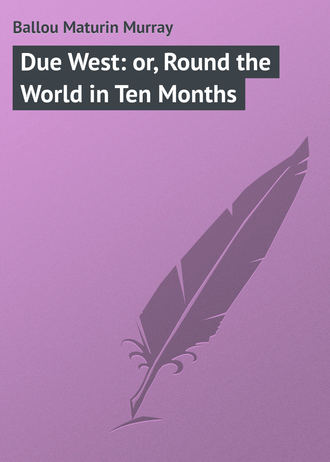
Due West: or, Round the World in Ten Months
There were men, women, children, and animals, each little group a family, picturesque in their squalor and their coarseness. Their brown, flat tents were of the same shape and material as those we had seen between Suez and Ismailia. Naked children and half-clad mothers peeped at us out of their canvas homes, or raised their heads above the awkward saddles and trappings of the kneeling camels, behind which they reposed. The docile, uncouth, buff-colored beasts were soberly chewing their cuds, and resting after their long and weary journey. It was a striking scene, which an artist would have traveled far to sketch, lying under a warm, hazy, atmospheric covering, so peculiar to Egypt and Africa, with the rough, red stone walls of the city for a background, and the arched Moorish gateway at the side. Here and there were to be seen dapple-gray horses of unmistakable Arab breed, animals which any rich European would have been proud to own. In one instance, seeing a fine full-bred mare and her foal lying down amid a family group, the children absolutely between the mother's legs, who was untethered, and the colt also extended on the ground with them, at our request the guide asked of the sober old Arab, who sat cross-legged, smoking by the entrance of the tent, what he would sell us the horse and colt for. "Tell your chief," was his answer, "there is not enough money coined to purchase them." This was a good and independent response. "But," added the guide, "he will sell you his wife, or any of the children!" We were contented with purchasing some fresh dates from an itinerant, who cried them in good, sonorous Arabic, "O dates, in the name of the Prophet!" and got most iniquitously cheated, both in quality and in price, according to the guide.
At sunrise, on the morning following our arrival, mules were ready at the door, and we started off, laughing merrily over the crude saddlery and other untoward fittings of the animals. Ladies' side-saddles are yet a myth in Morocco. We were bound for Washington Mount, a league or two outside the city walls, where the American Minister, several foreign consuls, and a few rich merchants of European birth make their homes, in handsome modern villas, surrounded by perennial gardens and orchards. The vegetation was often so rank as to overhang the narrow and steep roads up which we wended our way. They were so thick with agave and prickly pear, that we could hardly keep upright in the saddle. The trefoil, honeysuckle, myrtle, and white convolvulus grew in rank profusion, with occasional pale pink, single-leaved roses. Over the hedges in the private grounds, though it was early in March, we saw the orange-trees and pomegranates, the former laden with large, yellow fruit, and the latter blushing crimson with flowers among companion palms, figs, and olives. On the way through the meadow, before coming to the ascent, the ground was enameled with a pale blue daisy, which the guide told us was perennial here. After an hour's ride, emerging upon the high, open plateau, there burst upon our eyes a most enchanting view. The far-reaching waters of the Mediterranean seemed to surround the land upon which we were. Looking off towards the Spanish coast, a few white sails intervened to give character to the maritime scene; while a large steamship was making the passage of the straits, leaving behind her a long line of dense smoke. How suggestive was that expanse of waters, the most interesting of all known seas: its shores hallowed by associations connected with the entire progress of civilization; the cradle, as it has been aptly called, of the human race, the battle-field of the world, and still the connecting link between Europe, Asia, and Africa.
All around us, upon the sloping hill-side, were delightful villas, painted in bright colors, and half buried in thrifty foliage, each located in an atmosphere redolent of fruits and flowers; its front ever open to that glorious sea-view. The broad piazzas of these smiling homes were hung with hammocks, telling of luxurious out-door life. Family groups could be seen taking their morning coffee on the verandas; and the voices of many children rang out clear and bird-like, floating up to the eyrie where we were perched. Down towards the shore lay brown, dingy, dirty Tangier, with its mud-colored groups of tiled roofs, its teeming population, its mouldy old walls and arched gates, and its minarets, square and dominant. On our way back, we again passed through the slave market, and saw a freshly arrived caravan pitching their tents after a long and weary journey. A snake-charmer was busy amusing an idle group of boys and girls in one of the small squares, and a group of dancing girls, with tambourines and castanets, looked wistfully at us, hoping to get an audience; but our yet unhonored breakfast awaited us, and the mountain excursion had imparted healthful appetites.
It was quite the thing to patronize one of the little dingy cafés, and so we patiently endured the punishment of drinking an egg-shell cup of a muddy compound called coffee, but nothing short of compulsion would have induced a repetition of the same. A dose of senna would have been ambrosia compared to it. In passing through a narrow court we saw a group of children sitting cross-legged, in a circle, on the floor of an open house, with books in their hands, presided over by a sage-looking Moorish party, with long, snow-white beard, and deep-set dark eyes that seemed to burn like gas jets. The guide explained that it was a native school; and the children, who were all talking aloud at the same time, in a drawling, sing-song tone, swaying back and forth incessantly, were learning their lessons. When we inquired what special branch was being taught them, he answered: "The Koran; they learn it from the beginning to the end." "And is that all the instruction imparted to them?" we asked. "Of course," he replied; "what else do they require in Morocco?"
The houses were more like toys than dwelling-places, they were so very small, rarely of more than one story, the walls whitewashed to such a degree as to be almost blinding. Now and then the monotony was broken by an arabesque window, but, as a rule, there were none opening outward; like all Moorish houses, they had a small inner court upon which doors and windows opened, thus avoiding being overlooked, and promoting the seclusion of the harem, which seems to be the first and foremost idea of the Eastern people. Nearly the last sound that greeted our ears as we walked down over the irregular pavements, and through the narrow lanes towards the pier from whence we were to embark, was the rude music of the snake-charmer; and the last impressive sight was that of a public story-teller, in one of the little squares, in earnest gesticulation, as with a high-pitched, shrill voice he related to a group of women, who were squatted in their white haiks, and men of the desert in their hooded gehabs, what the guide told us was a chapter from the "Thousand and One Nights!" We embarked once more on board the little Leon Belge for Gibraltar, well pleased with our brief visit to the curious Moorish capital.
The Sultan of Morocco is supreme, and holds the lives and fortunes of his subjects at his will. He is judge and executor of laws which emanate solely from himself. Taxation is so heavy as to amount to prohibition in many departments of enterprise. All exportation is hampered, agriculture heavily loaded with taxation, and only so far pursued as to supply the barest necessities of life. Manufacture is where it was centuries ago, and is performed with the same primitive tools. The printing-press is unknown. There are no books; the language itself is such a mixture of tongues and so corrupted as to have hardly a distinctive existence. The power of the sultan sucks the life-blood out of the people, who obey the local sheikhs; above them are the cadis, controlling provinces; and still higher the pashas, who are accountable only to the sultan. And yet the Berbers, so-called, who form the basis of the native population, outnumbering the Moors, Arabs, Jews, and Negroes, and who live mostly in the nearly inaccessible mountains of the Atlas, are so independent, savage, and turbulent, as to nearly defy the imperial authority, yielding only so far to its control as they deem advantageous to themselves. The Arabs occupy the plains and are nomadic; the Moors possess the wealth of the land and control most branches of trade, making their homes in the cities, and are the direct descendants of the Moors of Spain. Strange there should be such a spirit of detestation existing towards every idea associated with civilized and Christian life, but so it is at Tangier.
From Gibraltar to Malaga by sea is less than a hundred miles eastward along the coast. We embarked on board the English steamer Cadiz. Fortunately the trip is a short one, for the boat was filthy, and had just been transporting cattle from England to the Rock. The water was rough enough to make the few passengers, except ourselves, quite seasick; which, in the contracted accommodations of the Cadiz, made matters far from agreeable. To add to the discomfort there was a steady downpour of rain during the trip; but we were no strangers to such contingencies, and made the best of it. The irregular Spanish coast was in sight through a veil of mist nearly all the way until we landed, after a slight skirmish with the custom-house officers, at Malaga, March 15th. It is commercially one of the most important cities of Spain, and was once the capital of an independent state, with plenty of ancient lore hanging about it, as it was a large and prosperous Phœnician capital centuries before Christ. The older portions of the city have all the Moorish peculiarities of construction, – narrow streets, narrow passages, small barred windows, and heavy doors; but the more modern part of Malaga is characterized by broad, straight thoroughfares, and elegantly built houses. This is especially the case with the Alameda, which has a central walk lined on either side with handsome almond-trees, edged by plats of flowers, and green shrubs intermingled, besides which there are statues and a fountain of an elaborate character at the end of the walk. On either side of this promenade is a good roadway, flanked with houses of pleasing architectural effect, lofty and well relieved.
There are several fine open squares in Malaga, some of which contain statues and ornamental trees and flowers. The discovery, not long since, of Roman antiquities in the environs has created a warm interest among archæologists. The trade of the city in wine, dried and green fruit, is large; and we were told that nearly nine tenths of the forty thousand butts of sweet wine, sold here for foreign use annually, were exported to the United States. On the whole, we were agreeably disappointed at the thrifty and business-like aspect of the city. There are no picture-galleries or art treasures to examine; but the people of new localities are always an interesting study, and the shops were decidedly the best we had seen since we left America. There is a grand cathedral, which is considered almost the only place worth exhibiting to strangers. It is of rather modern date, having been commenced in 1528, and is of mixed style, its façade constituting almost its only feature of remarkable beauty.
The old Moorish castle, crowning the seaward heights, has been converted into a modern fortress, and is well worth visiting for the superb view to be obtained from the battlements. Few people now come to Malaga except for a special purpose. In a sanitary point of view, as a resort for consumptives, it has long enjoyed a reputation which it certainly does not merit to-day, whatever it may have done in the past. First, it is much too cold and damp for delicate lungs. Again, it has not one comfort or social attraction to interest the visitor in search of health. Moreover, its sewerage is shamefully defective. Indeed, in the older parts of the town, the surface gutters receive and convey all the accumulated filth, so that the atmosphere is most unfavorably influenced. The published mortuary statistics have been unfairly given, as the mortality is larger in percentage than in any other part of Spain, which, as a rule, is far from possessing a healthy climate. We doubt if physicians any longer advise their patients to resort thither, certainly they would not do so if possessed of personal experience of the place.
The present population is a little over a hundred and twenty thousand, and is made up of a community of more than average respectability, though it would appear that there is an unreasonable percentage of beggars to be met with. In and about the cathedral of Santa Barbara the visitor finds this nuisance extremely annoying. Malaga has one of the largest bull-rings to be found in Spain. We were shown all over its various offices with evident pride on the part of the custodian. All contingencies, are here provided for. One apartment, with the necessary appliances, is arranged as a surgery, so that if the picadors, chulos, or matadores (bull-fighters) be any of them seriously wounded, the surgeon, who is always in attendance, can at once proceed to business. Another large apartment is fitted up as a Roman Catholic chapel. If any of the bull-fighters are fatally injured and about to die, here the priest, as regular an attendant as the surgeon, can administer the last rite, shrive the sufferer of all sin, and start him on his triumphant way to other, and, it is to be hoped, happier hunting-grounds. At the bull-ring the populace, to the number of from fourteen to fifteen thousand, assemble nearly every Sabbath during the season, to witness this most cruel of all sports. No seat is left unoccupied, and, as we were informed, the day before the exhibition tickets are nearly always sold at a premium. The devotion of the Spaniards to this national sport is universal, from the grandee to the peasant. More than once has the attempt been made by the throne to bring the cruel business into disrepute, but it has been found unavailing. The taste is too deeply rooted in the masses of the people. We were told subsequently, at Madrid, that an attempt to suppress the bull-fights in Spain would be more likely to lead to a revolution than would the most stringent political measure that could be named. The cry of the mob is "Bread and bulls," which is very significant to those who have studied Spanish character.
The English cemetery, laid out upon a terraced hill-side just out of the city borders and overlooking the harbor, is a very interesting resort, admirably kept and appropriately ornamented with choice trees, shrubs, and flowers, tropically luxuriant from its southern exposure. In the squares, streets, and market places of Malaga, women sat each morning weaving fresh-cut flowers, fragrant clusters of rose-buds, mignonette, pansies, violets, and geraniums, pretty little clusters of which they sold for about one shilling, and found ready purchasers. One may be sure there is always a refined element in the locality, whether otherwise visible or not, where such an appreciation as this is manifested. The bull-fight may thrive; the populace may be, as they often are in Malaga, riotous and mischievous; education may be at a very low ebb, art almost entirely neglected; but where a love of nature, as evinced in the appreciation of beautiful flowers, is to be found, there is still extant on the popular heart the half-effaced image of its Maker.
The Spanish heart is by no means all bad. That the bull-fight fosters a spirit of cruelty among the masses no one can doubt, and that cruelty is a characteristic of the Catalan race is also only too well known. No other people would tolerate such cruelty; and that it is a disgrace to the nineteenth century every intelligent person outside of Spain will admit.
It is a very interesting fact, but seldom realized, that Spain in the time of Julius Cæsar contained nearly eighty millions of inhabitants, but to-day it has less than eighteen millions. In glancing at the map it will be perceived that Spain is a very large country, comprising nearly the whole of the southern peninsula of Europe (Portugal being confined to a small space), and extending north and south over six hundred miles. It is about double the size of Great Britain, and is rich in every known mineral, though she is poor enough in the necessary energy and enterprise requisite to improve her extraordinary possibilities. In many sections of the country great natural fertility is apparent, but nature has to perform the lion's share of the work. We were told by intelligent residents that many parts of Andalusia, for instance, could not be exceeded for rural beauty and fertility in any part of Europe, though we saw no satisfactory evidence of this; indeed, what we did see led to a contrary conclusion. In the environs of Malaga and the southern province generally, there are orange, lemon, and olive groves miles in extent; and the Moors had a poetical saying that this favored region was dropped from paradise, but there is more of poetry than truth in the legend. What is required is good cultivation and skilled agricultural enterprise. These would develop a different condition of affairs, and give to legitimate enterprise a rich reward. The sugar-cane, the grape-vine, the fig-tree, and the productive olive, mingling with the myrtle and the laurel, gratify the eye in and about the immediate district of Malaga; but as one advances inland, the products become natural or wild, cultivation primitive and only partial; grain fields are sparse, and one is often led to draw disparaging contrasts between this country and those of more ambitious and industrious agricultural nations.
While the more practical traveler is filled with a sense of disappointment at the paucity of thrift and vegetation, the poet and the artist will still find enough to delight the eye and fire the imagination in Spain. The ever transparent atmosphere, and the lovely cloud effects that prevail, are accompaniments which will hallow the desolate sierras for the artist at all seasons. The poet has only to wander among the former haunts of the exiled Moors, and view the crumbling monuments of his luxurious and artistic taste, to be equally absorbed and inspired.
CHAPTER XI
From Malaga to Granada. – Military Escort. – A Beautiful Valley. – A Dream Realized in the Alhambra. – The Moor in his Glory. – Tangible Poetry. – A Brief Legend. – The Generalife. – The Moor's Seat. – The Home of the Gypsies. – A Gold Bearing River. – A Beautiful Residence. – Early Home of the Ex-Empress Eugénie. – City of Granada. – Spanish Beggars. – The Remarkable Tomb of Ferdinand and Isabella. – French Vandals. – The Cathedral. – Precious Relic. – The Cartuja. – Love of Music.
The distance from Malaga to Granada is about seventy miles, but in Spanish style it requires eight or nine hours to accomplish it. Needless delay is the rule here, and forms a national infirmity; but in the present instance we did not feel in special haste, nor regret the snail's pace at which the cars were run, as the road lay mostly through a very beautiful valley, lined on either side by high hills extending back until they terminated in lofty, snow-clad ranges. The contrast between these ice-crowned elevations not very far away, and the orchards of oranges and lemons in full bearing so near to us, was certainly striking. The dull, dusty green of the olive orchards, of which there were more than of all other trees combined, gave a rather sombre appearance to many miles of the route; but the cheerful light verdure of the occasional grain fields and pastures afforded relief to the eye.
There were but few people to be seen, quite unlike European agricultural districts generally, where human life is ever so conspicuous. The cultivated spots seemed to be very far away from the hamlets whence the owners must come for field labor. It was obvious that for some strong reason the populace, sparse at best, herd together. There were no isolated farm-houses or huts. The cultivators must ride or walk long distances to reach the field of labor. Perhaps mutual protection, as in the olden time, was the inducing cause of the country people thus keeping together, and the necessity of congregating for mutual support in an exigency has by no means entirely ceased. Now and then the cars would dart suddenly into a dark tunnel, when we skirted the mountain sides, to emerge again upon a scene of redoubled sunlight, for a moment quite tantalizing to the vision, reminding one forcibly of some Swiss and Italian roads where car-lamps are burned all day. As occasional bands of brigands appear, and, stopping the trains, rob the passengers, government kindly complimented us with an escort of a dozen soldiers, and we were told that these redoubtable warriors now accompany each train, besides which two or three good-looking high privates, in neat uniforms, were observed at each of the stations where we stopped, marching up and down before the train and eying the passengers, as though they half suspected us of being banditti in disguise. It is clear that the administration is endeavoring to render traveling safe throughout the country, and if they would only render it comfortable and expeditious at the same time, the reform would commend itself to universal approval. Punctuality is not a Spanish word, being neither practiced nor understood from Malaga to Burgos. You take your seat trustingly for some objective point, but when you will reach it is a profound and subtle mystery which time alone can solve.
Perhaps no one ever read Washington Irving's description of the Alhambra without experiencing an ardent desire to visit Granada. Although that exquisite pen-portrait reads more like romance than veritable history, yet it is minutely correct and absolutely literal, teeming with local color and atmospheric effect like the canvas of a Claude Lorraine or a Bierstadt. As we approached the ancient city, all early recollections of the glowing text were revived; nor had months of constant travel rendered us so blasé but that an eager anticipation thrilled every nerve. The train crept slowly along in the twilight with provoking deliberation, until we were finally deposited in the depot of the gray old capital, so intimately connected with the most romantic chapters of Spanish history. How vividly the days of Ferdinand and Isabella flashed before the mind's eye, mingled with which was the abortive career of Charles V. Here set the sun of Moorish glory. This was Granada, and here, close at hand, was that embodiment of poetry, the Alhambra.
The city once contained over half a million of people, but to-day it has scarcely sixty thousand, – like everything else material in Spain, growing smaller by degrees and beautifully less. After leaving the centre of the town, we drove some distance until the ground began to rise sharply, and we passed through a dense grove of tall elms planted many years ago by the Duke of Wellington. These trees have grown in such a rank, wild fashion, hung with ivy from the highest branches to the low interlacing stems, as to recall a Singapore jungle or the densely wooded district near Jeypore, in India. The trees have never been trimmed or thinned out since they were planted, and cannot, therefore, become individually grand, but they appear all the more natural for this seeming neglect. Presently the hotel, named the Washington Irving, was reached, an extremely neat and comfortable establishment. It was necessary to suppress our ardor and impatience, as night had settled down over Granada; and there being no moon, nothing could be seen to advantage outside of the house. We retired early, more fatigued by the slow, dragging railroad journey of seventy miles than after accomplishing the same distance over the primitive roads of California, behind four dashing horses in a jolting stage, between Madeira and Coarse Gold Gulch.
It is not for us to describe in detail so well-known a monument as this royal palace of the Moors, those regal sovereigns who had not only a love for the beautiful in art, but also the means of indulging it. With all preconceived ideas it was still a revelation, and, next to the Taj at Agra, the most poetical embodiment of architecture we had ever seen. Surprises met us at every turn within its enchanting precincts. The names of its various halls and courts, the Hall of Justice, Court of Blessings, Hall of the Abencerrages, Court of the Lions, Hall of the Two Sisters, etc., were all familiar, but only so in pictured dreams. Here was the tangible reality; it was no disillusion. As we passed from court to court, from hall to hall, lingering here and there, how the very atmosphere teemed with historical reminiscences of that most romantic period of history, the mediæval days, when the Moors held regal court and lorded it in Andalusia. A lurking sympathy stole over us for that exiled people who could render life such a terrestrial paradise. Surrounded by fruit, flowers, and dark-eyed houris, the Mohammedan but typified his idea of a higher heaven. In the Alhambra he might have closed his eyes to the outer world, and fancied that he was already in that sensuous and perpetual home which the Arabian poets so glowingly describe. It is difficult to realize that the Moors possessed such admirable architectural skill, and produced such splendid palaces, centuries upon centuries ago; and quite as remarkable that Time, the great iconoclast, should have spared for our admiration such delicate, lace-like carvings and such brilliant mosaics. Magnificence with them was an art in itself, and, combined with beauty, was one of their highest aims. Minuteness of finish and perfection of detail were lavished with Oriental profuseness. If we carefully examine the fret-work upon the walls of the various corridors and apartments, it becomes evident that it represents flowers and geometrical lines, though at a casual glance it has rather a confused appearance. The various spaces are filled with lines from the Koran; the words "There is no conqueror but God" occurring many hundred times in the various parts of the structure, in the delicately lined work over the horse-shoe arches, upon the plainer side walls and over latticed jalousies, and along the architraves.


